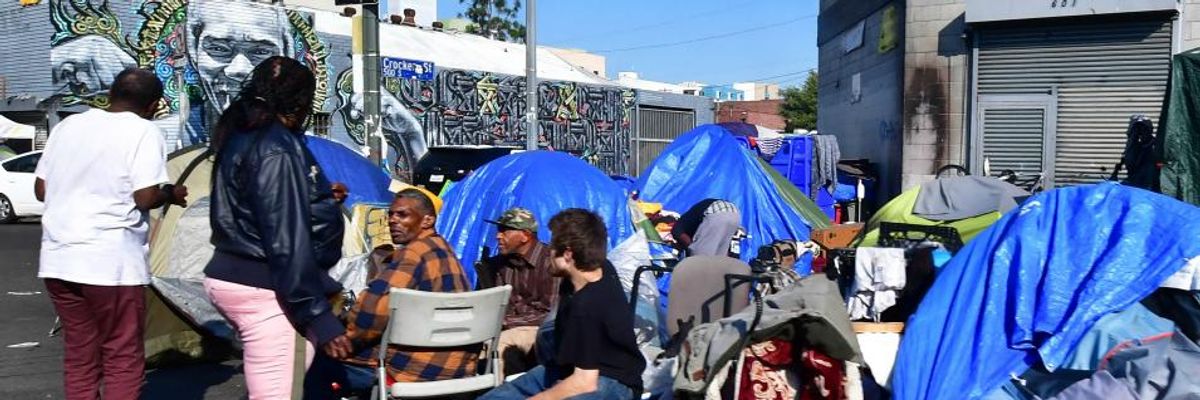Ralph da Costa Nunez repeats himself--a lot.
Not because he's unfocused, but rather because he's laser focused. The founder of the Institute for Children Poverty and Homelessness (ICPH) repeats himself because there's an enormous disconnect between people who understand the root causes of homelessness and the powers-that-be in the U.S. federal government.
This week, in New York City, da Costa Nunez and his miracle working staff at ICPH are welcoming homeless advocates from 40 states and a handful of foreign nations to come together and get a better handle on the endemic epidemic of homelessness. In fact, it's the endemic nature of this national catastrophe being stressed this year. The conference catch phrase--which states "Family homelessness is a national experience and a local issue"--is designed to emphasize just how universal this affliction is.
In his opening remarks, da Costa Nunez, who has labored over the public housing issue through six presidential administrations and as many New York City mayoral administrations, reminded his audience that while the problem isn't new, Trump's presidency makes the problem "more relevant than ever." And it's not lost on him that three of the New York City Mayors who have taken on homelessness--and come away overwhelmed and defeated--are heavily involved in presidential politics. Rudy Giuliani, Michael Bloomberg, and Bill de Blasio weren't able to control homelessness--because they never really addressed the root cause of homelessness--poverty.
"Homelessness is a system today," da Costa Nunez explained, "It's a system with feedback loops." Whether corrective measures to the housing issue were well-intentioned or ill-intentioned, he continued, "the environment for homelessness is poverty" and when poverty is out of control, homelessness is unavoidable.
Da Costa Nunez, an historian and Columbia University professor, explained the history of the United States to a room filled with social workers. He put a generational perspective onto the job these men and women do daily. He made passing reference to the 19th century solution to homelessness--westward expansion. Impoverished individuals, families and orphans were encouraged to tackle the new frontier. Yes, even orphans. Few Americans know that young paupers were put on trains and sent west to work on farms.
Without historic perspective, Americans misunderstand the U.S. national legacy of homelessness and believe it to be a modern American phenomena.
Da Costa Nunez linked the ebb and flow of poverty rates with the willingness of government leadership to address the problem. He gave Franklin Roosevelt's New Deal, Social Security and Welfare programs credit for dropping the post-Depression Era poverty rate in the U.S. from 50 to 20 percent.
He then gave a nod to Lyndon Johnson's Great Society. Food assistance, Medicare, Medicaid, head start programs, support for public education and the expansion of civil rights further reduced poverty rates--resetting the number to 10 percent--as a historic low never seen before or since.
Then Ronald Reagan became president. The country's leaders shifted focus from housing sustainability for all to enhancing the wealth opportunities of a certain few. Reagan's administration systematically dismantled the work done by his predecessors. With little fanfare or discussion, poverty rates climbed and homelessness increased.
The next president willing to talk publicly about welfare, Bill Clinton, blamed the poor for their troubles. Appeasing the holdover Reaganites, the feds privatized poverty. Charitable organizations and local agencies inadequately filled the gap created by Clinton's welfare reform. Warehousing the poor became the job of a private sector that relied on reduced federal funding. Under the guise that the tax payer was saving money, the department of Housing and Urban Development (HUD) stopped being an answer to housing needs. HUD became a maintenance organization--curating what little public housing is still available--and securing the silence of the agencies and housing authorities that receive funding.
da Costa Nunez laments the way school vouchers have decimated public schools. "Public education is what socializes people in a country," da Costa Nunez said as he explained the incredible blow inadequate education funding has dealt the poverty class. The wealth class uses vouchers to send their kids to private schools. da Costa Nunez asked his audience, "Where do the poor go" when they only have vouchers? Nowhere, he said, but in circles.
When there is no new public housing and less and less public education to socialize and educate folks out of poverty, the situation only worsens. With the deregulation and institutionalization of poverty, what are municipalities to do with the homelessness epidemic without an adequate supply of affordable housing?
In New York, of late, they built 90 new shelters. "Shelters," da Costa Nunez remarked, are "the alternative to affordable housing." But shelters don't tell you anything about the size of the problem at hand. Instead of improving the lives of others by building new housing, sheltering just gives inadequate data. As da Costa Nunez explained, "We have 60,000 people in our family shelters because that's what our shelters hold... but there are 114,000 homeless school kids."
For da Costa Nunez, the circles the poor go round in are accelerated by the revolving door reality at the shelters. The Housing First program gets folks into homes they can't sustain--their low wages can't keep them housed--once housing vouchers expire. After two years the program they are enrolled in ends, and housed lose their home, and wait for shelter again.
What if one of the few New Yorkers who isn't running for president, Ralph da Costa Nunes, was the president? What sort of housing would he commit to and finance?
"Community residences... day care programs... after school programs. It isn't housing we need--it's housing stability," he said. "It's an education issue, an employment issue. Build new housing, [fund] education, put the services into the poor communities. Build community centers with residential programs and allocate all the resources necessary" for success.

